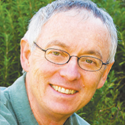
BEING HERE, RIGHT NOW
by Dr Graham Williams
It’s surprising when you discover how much time we spend lost in our thoughts. Tests have shown that, on average, we are directly in touch with our senses for only about five minutes in every hour. Most of our lives we are thinking about the past, or planning the future.
When we are tense or anxious we are usually thinking too much. This is exhausting and unhealthy for the body because thinking is an active process which takes up a lot of energy. We get caught in this cage of thought, and can find it very difficult to get out again. The stress we all suffer from to some degree, and the difficult emotions like anxiety and panic which many people can experience, actually come from getting caught in this cage of thought.
Meditation – moving from thinking to sensing
Meditation comes in all shapes and forms, but no matter how many different kinds of meditations there are, they are all a tool for doing one thing. This is moving your mind from thinking to sensing, from the thoughts you live in most of the time, to your body. You are moving from doing to being. The beauty of meditation is that it is a tool which you can learn. It is the art of relaxing the body and calming the mind whenever you choose.
When you move your mind from you thinking to your senses, your awareness of the world around you opens up. You become mindful of the rich kaleidoscope of sensations which bathe your body every moment of the day. The colours and shapes, the range of sounds, smells and tastes, and the feelings which come from everything which touches your skin – from the clothes you wear to the wind caressing you as you move.
When you reconnect with your body in this way it relaxes and its balance and health is restored. At the same time the balance between your mind and body is restored, bringing about a degree of tranquility and mental clarity which people often find they never imagined possible.
Being instead of doing
We are extremely good at doing – at being busy and keeping ourselves occupied. In fact, many of us feel as though we don’t really exist unless we are doing something, so much so that we virtually identify with our job. But children are much wiser. They know how to sit and just watch something, getting totally absorbed in it.
Thinking is the skill which gives us the ability to plan and which has made us so successful as a species. But it comes with a cost, and this is that it is impossible to think and be in touch with your body at the same time. So thinking is a magnificent servant, however when you let it rule your life, it becomes an absolutely tyrannical master.
The American physician and psychotherapist, Alexander Lowen, put it well when he said: “The domination of the personality by the ego is a diabolical perversion of the nature of man. The ego was never intended to be the master of the body, but its loyal and obedient servant. The body, as opposed to the ego, desires pleasure, not power. Bodily pleasure is the source from which all our good feelings and good thinking stems”.
Every time you meditate, however, you are being instead of doing – receptive instead of active. The beauty of it is that you are entirely conscious of what is happening, unlike normal relaxation where we tend to clock off.
The natural bliss of your body
When you meditate, you can notice your body becoming very still, your breathing becoming lighter and a wonderful warmth, or a tingling sensation, which arises as your senses open and you feel the life, peace and vibrancy of your body.
Nearly every student we teach in our courses at the Centre is surprised at how quickly they can reach this state by meditating. They discover how much what they are feeling is caused by their minds never being able to rest – for we have all lost the ability to know how to stop the mind.
They discover, too, what happens when they become aware of their bodies, in the safe, immediate way that meditation provides. They notice the blissful feeling which opens up when they become aware of their senses, and they find out how to ‘just watch’ and be mindful of something instead of being caught in it. Through meditating they re-discover what it is like to be here, right now.
Dr. Graham Williams has over thirty years’ experience teaching both meditation and mindfulness, is the Director of The Lifeflow Meditation Centre and an adjunct lecturer in the School of Medicine at Flinders University. He has written two books, Insight and Love which is in its third edition and Life in Balance. They are both available online. The Lifeflow Centre provides regular meditation courses in their city studio and retreats at their retreat centre in a beautiful, relaxing hills setting. P 8379 9001 W lifeflow.com.au